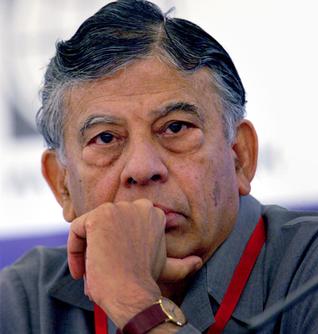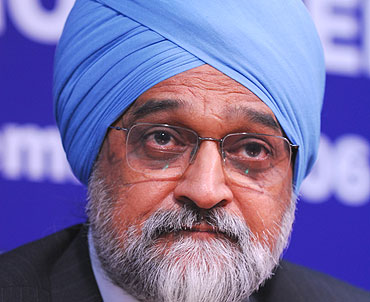
 Economists Vijay Kelkar and Montek Singh Ahluwalia richly deserve to be on this year's Padma Vibhushan honours list. The list of Padma Vibhushan awardees for 2011 includes two economists, Vijay Kelkar and Montek Singh Ahluwalia, who have made distinguished contributions to the design and implementation of economic policy in India for over three decades. The impact of the policies they initiated has been far reaching, even when they were not taken to their logical culmination.
Economists Vijay Kelkar and Montek Singh Ahluwalia richly deserve to be on this year's Padma Vibhushan honours list. The list of Padma Vibhushan awardees for 2011 includes two economists, Vijay Kelkar and Montek Singh Ahluwalia, who have made distinguished contributions to the design and implementation of economic policy in India for over three decades. The impact of the policies they initiated has been far reaching, even when they were not taken to their logical culmination.
Ranking achievements in a career as distinguished as that of Kelkar is indeed daunting. Nevertheless, four conspicuous achievements merit mention. As petroleum secretary (1994-97), Kelkar proposed decontrolling fuel prices make the pricing of petroleum products more responsive to market signals.
The reform group set up in the dying days of the Narasimha Rao government included both public and private sector representatives.
The plan called for a gradual dismantling of the administered price mechanism over a five-year period to achieve full decontrol by March 2002. The price of kerosene was to be increased in a staggered manner, while subsidies on liquefied petroleum gas would be similarly reduced.
The plan failed to take off because the NDA government that assumed power in 1999 developed cold feet. Fuel price decontrol has been revisited, starting with the Rangarajan Committee and the latest headed by Kirit Parikh. The unanimous recommendation to decontrol prices simply indicates the absence of options, something first highlighted by the Kelkar-led reform group.
The UTI crisis in 1998 led both domestic and non-resident Indian investors to desert the fund's flagship US-64 scheme in droves, when it was realised that the fund would not be able to pay the almost ritual 20 per cent dividend - a practice followed since its inception in 1964.
Kelkar's energetic response, fully backed by the then minister of finance, Yashwant Sinha, was responsible for ensuring that as a whole, nobody lost money.
The response plan involved instructing Industrial Development Bank of India to buy equity to prop up the equity market, while simultaneously getting public sector banks to buy US-64 to bolster investor confidence.
The finance ministry's alacrity in responding to a crisis that could have snowballed into something much bigger is in no small measure responsible for getting UTI back on its feet.
The Kelkar Committee's recommendations on tax reforms that call for networking banks, the Reserve Bank of India and income-tax department would go a long way in providing ready online information on tax collection, refunds, etc, to all three for fund settlement.
However, Kelkar's most potentially far-reaching contribution could be as chairman of the 12th Finance Commission, which was charged with providing a blueprint for a uniform goods and services tax.
Among its many benefits, GST would lower the tax rate by broadening the tax base and reducing exemptions, cut compliance costs by fostering a common market across the country, spur economic growth, boost exports and in general facilitate investment decisions being made on economic principles.
Despite some operational problems, GST would bring India in line with global best practices, besides usher in benefits whose present value is conservatively estimated at $500 billion. GST is a potential game-changer.
Montek Singh Ahluwalia's track record of public service and in holding top-level global advisory positions is equally distinguished. Ahluwalia has been arguably the most steadfast reform-minded economist in India over the past three decades.
As legend goes, it was his paper on structural adjustment and reform, written at the behest of the then Prime Minister V P Singh, who Ahluwalia advised as special secretary, that laid the blueprint for the reforms of 1991 that followed. While the inevitability of dismantling the socialist infrastructure assiduously built since independence was well known in policy circles since the mid-1970s, Ahluwalia's paper was arguably the seminal document, notable for its wide canvas.
As is now well known, the reforms abolished industrial licensing, paving the way for unleashing the entrepreneurial energy that has been increasingly driving economic growth in India over the past two decades.
The liberalisation of tariffs has enabled Indian firms to import capital goods needed to improve productivity, which in turn has engendered economy-wide benefits. A simultaneous attempt to boost exports has ensured greater integration with the global economy.
The reform agenda is far from complete. Privatisation of public sector enterprises, reduction in subsidies and rationalisation of power tariffs is still work in progress at best.
However, the role of reforms in firmly placing India on a high growth trajectory for two decades cannot be diminished. While Narasimha Rao deserves credit for the political courage to push through reforms, and Manmohan Singh for its implementation, the role played by Ahluwalia, Raja Chelliah and others in providing the intellectual foundations of a very complex process also needs to be acknowledged.
In his role as deputy chairman of the Planning Commission, Ahluwalia has strongly pushed for public-private partnerships, especially in infrastructure, given the government's limited finances, which was apparent during the financial downturn of 2007-09.
While the Indian economy has staged a remarkable comeback since the middle of 2009, it would be unrealistic to expect the entire infrastructure budget for the 12th Five-Year plan estimated at $1 trillion to be funded exclusively by public resources. PPP is the way of the future and needs to be encouraged.
Kelkar and Ahluwalia join the distinguished band of economists such as Chelliah and C Rangarajan to have been awarded the Padma Vibhushan in acknowledgement of their contribution to economic policy reform and allowing India to tide over potentially awkward situations over the past few decades.
Like their predecessors, this year's nominees richly deserve the honour.
target=_new>https://im.rediff.com/money/2011/feb/03budlogo.jpg" WIDTH=300
HEIGHT=110 border=0>






